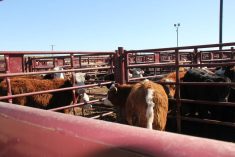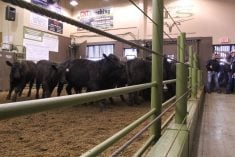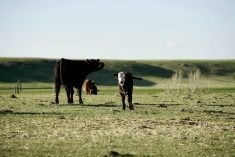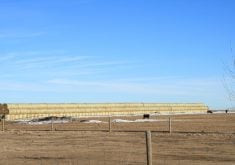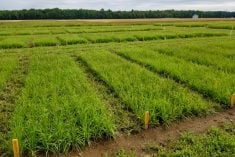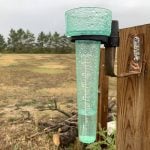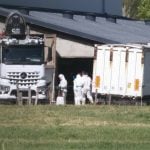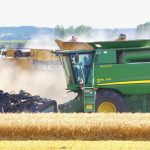For Julia Flinton of Williams Lake, B.C., agriculture is part of her heritage and her daily life.
Flinton has accomplished a lot, including obtaining an ag business degree while on a hockey scholarship at the University of Saskatchewan, followed by spending several years as a firefighter.
Today, Flinton works as a food systems program manager for Indigenous Sport, Physical Activity and Recreation. It’s a role that puts her interest and experience in sustainable agriculture to work alongside Indigenous communities.
Read Also
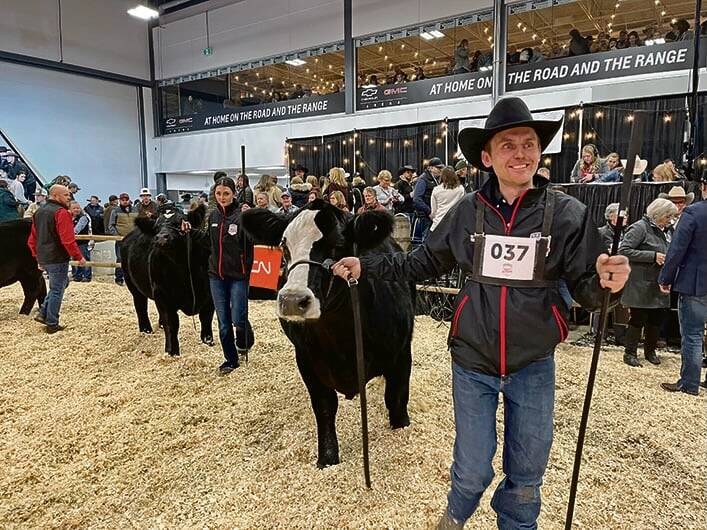
What to know before you go to Agribition 2025
If you’re attending Agribition 2025, this is the place to find out about tickets, dates and what’s happening this year.
“I want to work in agriculture — that is definitely my passion — and I want to work in tandem with First Nations,” she says, adding that her husband and daughter are part of the Williams Lake First Nation. “It’s a topic that’s very near and dear to my heart. It’s both sides of the coin in terms of ranching. And my family is Indigenous, and I want to better my relationship between the two.”
Flinton is enthusiastic about the beef cattle sector, which prompted her to successfully apply to the Canadian Cattle Young Leaders (CYL) mentorship program.
She has also stepped up to be a leader on her own terms by establishing the Williams Lake First Nation 4-H Club.
Growth through mentorship
Flinton, who recently graduated from the CYL program at the Canadian Beef Industry Conference (CBIC) in Penticton, B.C., says being selected for the program was a game changer.
“I knew I wanted to get more involved in the beef industry and wasn’t sure what that would look like,” says Flinton, who is a third-generation beef producer and considers herself a small-scale rancher.

She found the program welcoming to all types of beef industry stakeholders, regardless of whether participants came from large operations or even whether they had cattle at all.
Flinton says she didn’t expect to be a finalist, but when she was accepted to the program, she knew she wanted to put everything she had into it and proceed with an open mind.
“I talked to a few people in the area who had gone through (CYL) and the feedback was that you get out what you put in,” says Flinton. “A lot of it depends on who you’re paired with and being committed to the focus point — but being willing to adapt your focus point if you need to, depending on what’s happening in your life.”
Flinton indeed dealt with unexpected life events when her father-in-law passed away suddenly in the spring. The sad time both strengthened her resolve and made her evaluate what really mattered, which was being present for her family.
“Having those people there in your life, you cherish it more, you don’t take anything for granted,” she says.
“(CYL) could have fallen off the boat at that point but I had a really great support system,” she says. “Both my husband and my family and his family supported me and said ‘No, you need to keep doing this.’”
Flinton felt fortunate to be paired with Judy Guichon, a Nicola Valley rancher and beef industry leader, as well as B.C.’s former lieutenant-governor.
“Judy was amazing and is such an asset for the beef industry and just as an individual,” says Flinton. “She’s a salt-of-the-earth lady who has done some amazing things in her life.”
One of Flinton’s mentorship highlights was touring Guichon’s ranch. “I told her I feel like I’m meeting a celebrity, but she welcomed me saying, ‘I’m just the neighbour.’”
In addition to meeting with Guichon at her farm, Flinton also attended the Canadian Cattle Association AGM in Ottawa, a CYL forum in Calgary and the CBIC.
She says networking with industry peers was validating. “To meet people that are your age, that are in a similar situation — that are the same with young families and trying to get into the sector and from all sizes and aspects — was eye-opening, in a good way.”
Leading by example
Three years ago, Flinton was approached about starting a local 4-H club. Having been a club member for 12 years, Flinton was interested. However, she also had a new infant and was apprehensive of the commitment at first.
“I thought about it for a long time,” she says. There was one other First Nations club in the region that Flinton could picture her daughter and stepson joining. With the encouragement and support of that nearby leader, she dived in and hasn’t looked back.

“The 4-H club is my heart and pride and joy for sure,” she says. “My goal was to be accessible to all First Nations kids that potentially wanted to do 4-H in the area, no matter what their financial or infrastructure situation might have been.
“We had an interest meeting in November of 2020 and I had the bare minimum — six kids from the Sugar Cane Reserve within Williams Lake First Nation,” she recalls. “By February, I had 20 kids and it was a successful first year.”
The Williams Lake First Nation 4-H Club just completed its second year with 30 members and 20 beef projects. “Out of the 30 kids, there were 26 of First Nations or Metis descent.”
The club offers beef, sheep and swine projects. “Having a few different projects makes it easier for kids to try something new and different and build their confidence,” she says.
“Our community is amazing in supporting this as a whole, and the band is supportive and has helped us out both financially and with amenities here.”
The Williams Lake First Nation has set up an area on their 150 Mile ranch location with pen space and infrastructure, which helps make 4-H a possibility for kids who otherwise may not have the option of participating.
“For kids that live on reserve, that might not have the space or the pens for whatever the project, they can keep their animal at the ranch in a cohort situation,” she says, while the kids tend to daily chores at the site.
“We are also making sure that the kids are acknowledging the financial aspect of things. After the first year, within reason, depending on what your project is, you have to help pay for feed and hay and teaching that aspect of things has been really beneficial.”
One of the challenges Flinton has found as a leader has been to step back and take a look at things from a different perspective.
“I took for granted my upbringing in the livestock sector, not even realizing what comes second nature to me doesn’t come second nature to everyone,” she says. “Things like approaching an animal like a steer that’s bigger and can kick, making sure kids are situationally aware of where they are.
“I didn’t even know how to teach that stuff, so that has been good for me to go back to the basics and take into account every child’s stage of where they might be at in terms of animals,” she says.
With everyone learning new skills, Flinton has had to adapt her delivery style. “Some kids you can give them the tough love or have the harsh conversation, but for some kids, that’s not going to work, so it’s been good for me to dial into different kids and be involved.”
The way forward
Flinton sees agriculture and First Nation collaboration as the key to finding common ground.
“I think in terms of the ranching community and the First Nations community, everything is so intertwined and everything is very involved in the other,” she says.
“Everyone is side-by-side. Whether you are from a generational ranch or a First Nations community, you’ve been neighbours for a long time, and I think being able to have safe and healthy conversations is really important.”
She adds that when the going gets tough, people come together. “There’s nothing like a natural disaster to put all the heady issues behind you and move forward,” Flinton says.
“In the 2017 forest fires, I was on an all-First-Nations crew fighting fire and you could definitely tell the respect and communities that were brought together that may have not been brought together before.
“Building the relationships back and the respect and trust back between groups is really important. So that’s what I’m trying to learn about and hopefully one day I can encourage and facilitate respectful and healthy conversations and help the two sides build back the trust and respect.”




